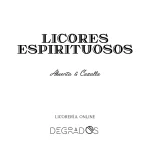Two of the most popular categories within this universe are herbal liqueurs and fruit liqueurs. Although they share the label of “liqueurs”, their differences in composition, elaboration process, flavors and uses make them unique products. In this article, we will explore these two categories in depth, helping you to better understand their characteristics and to decide which is the best option according to your tastes and needs.
Herbal Liqueurs: Ancestral Wisdom
Herbal liqueurs have a history dating back to ancient times, when civilizations used plants and spices to create medicinal tonics. Over time, these concoctions evolved into alcoholic beverages that preserve the essence and properties of herbs.
Composition and manufacturing process
The base of herbal liqueurs is usually a neutral distillate to which different herbs, roots, spices and, sometimes, flowers are added. Among the most common ingredients we find aniseed, licorice, mint, fennel, chamomile and wormwood. The proportions and combinations are a secret jealously guarded by each producer, which gives rise to a wide range of flavors.
The elaboration process includes maceration or distillation of the herbs in alcohol, followed by sweetening to balance the intense flavors. Some liqueurs are also aged in barrels to develop greater complexity.
Flavors and uses
Herbal liqueurs are known for their complex and deep flavors, ranging from sweet and smooth notes to more bitter and spicy profiles. This versatility makes them an ideal choice both to be consumed on their own and in cocktails. In addition, many of them are used as digestives due to their digestive system stimulating properties.
Popular examples
- Chartreuse: A French liqueur made with more than 130 herbs.
- Jägermeister: Famous German liqueur with a sweet and spicy profile.
- Amaro: Originally from Italy, with a predominantly bitter taste.
Fruit Liqueurs: Natural Sweetness
On the other hand, fruit liqueurs are a tribute to nature. These drinks celebrate the diversity of fruits available in each region, capturing their aromas and flavors in a delicious liquid form.
Composition and manufacturing process
The base of fruit liqueurs is similar to that of herbal liqueurs: a neutral distillate to which fresh fruits, juices, pulps or even peels are added. Some producers also use infusion techniques to extract the essential oils from the fruits.
The production process may include initial fermentation of the fruit, followed by distillation or maceration in alcohol. Sugars are then added to enhance the natural flavor of the fruit, but in controlled amounts so as not to overbalance.
Flavors and uses
Fruit liqueurs are known for their sweet and fruity profile, which makes them very popular in cocktails. They are also an excellent choice for desserts, either as an ingredient or accompaniment. From the vibrant flavor of citrus to the warmth of tropical fruits, these drinks are a celebration of nature in every sip.
-
 Liqueur for carajillo 70cl9,90€ IVA Incluido
Liqueur for carajillo 70cl9,90€ IVA Incluido -
 Limoncello di Maria 70 cl16,63€ IVA Incluido
Limoncello di Maria 70 cl16,63€ IVA Incluido
Popular examples
- Grand Marnier: A mixture of brandy and oranges.
- Limoncello: An Italian liqueur made with fresh lemons.
- Curaçao: Originally from the Caribbean, made with bitter oranges.
Direct comparison: What makes them different?
Although both types of liqueurs have a similar alcoholic base, their differences lie in the ingredients, flavors and uses.
Main ingredients:
- Herbal liqueurs: Herbs, roots and spices.
- Fruit liqueurs: Fresh fruits, juices and essential oils.
Flavor Profile:
- Herbal liqueurs: Bitter, spicy or slightly sweet.
- Fruit liqueurs: Sweet and predominantly fruity.
Common Uses:
- Herbal liqueurs: Digestive and base for classic cocktails.
- Fruit liqueurs: Ingredients for tropical cocktails or desserts.
History and Tradition:
- Herbal liqueurs usually have a historical background linked to medicine.
- Fruit liqueurs celebrate the natural richness of each region.
After exploring the general characteristics of herbal liqueurs and fruit liqueurs, it is clear that each one offers a unique universe of flavors and uses. Now, let’s delve into how to choose the right liqueur according to your needs, consumption moments and personal preferences.
What should you consider when choosing between herbal liqueurs and fruit liqueurs?
The choice depends on several factors, from your culinary goals to the environment in which you plan to enjoy them. Here are a few things to keep in mind:
Purpose of Consumption
- Digestive or Relaxing: Herbal liqueurs, such as Amaro or Fernet, are known for their ability to ease digestion after a heavy meal. If you are looking for a drink to complement a heavy dinner, this category is ideal.
- Celebrations and Desserts: Fruit liqueurs, such as Limoncello or Chambord, are excellent options to accompany desserts or to raise the level of a toast in special celebrations.
Temperature and Climate
- Cold Climates: Herbal liqueurs tend to offer a warm, spicy profile that is especially enjoyable in colder climates. A glass of Chartreuse or Bénédictine is perfect for warming up during the winter.
- Hot climates: In summer or in places with high temperatures, fruit liqueurs shine. Their refreshing profile makes them star ingredients for tropical cocktails, such as a Piña Colada enriched with a touch of coconut liqueur.
3. Cocktail Versatility
- Herbal Liqueurs: Ideal for classic cocktails such as the Negroni or the Old Fashioned, as they add complexity and depth to the mixes.
- Fruit Liqueurs: Perfect for vibrant and colorful cocktails, such as the Cosmopolitan or Margarita, thanks to their sweet and fruity notes.
Conclusion
There is no universal answer as to which one is better, as it all depends on your preferences and context. However, here are some final recommendations:
- For Complexity Lovers: If you enjoy drinks with depth and a touch of bitterness, herbal liqueurs are your best choice. Perfect for sipping slowly and exploring their layers of flavor.
- For the sweet tooth: Fruit liqueurs are ideal if you prefer bright, easy-to-enjoy flavors. They are especially recommended if you plan to share them at a gathering or as an accompaniment to a dessert.
Both herbal and fruit liqueurs have their place in the hearts of spirits aficionados. While one offers the wisdom of tradition and the richness of nature, the other celebrates the freshness and diversity of fruits. In the end, the best way to decide which one is right for you is to experience them personally, either in a carefully prepared cocktail or in their pure form.
Do you dare to discover your favorite? Explore the wide variety of options available in the market and let yourself be surprised by the wonders that each type of liqueur has to offer.






